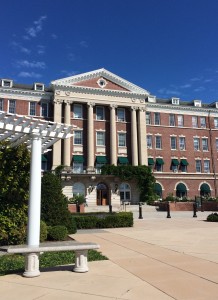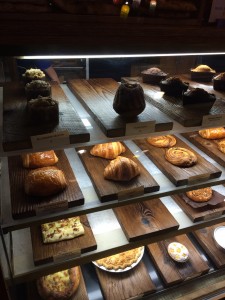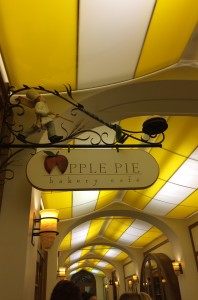The center to the acclaimed food region that is the Hudson Valley comes in a drive up route 9 past the town of Poughkeepsie and on the edge of FDR’s Hyde Park: the Culinary Institute of America. The campus itself looks more like a piece of french royalty then the Hudson Valley farm esthetic but truth remains that this place offers some of the most famous education in food service world. Walking around its massive stone courtyard, with the fountain spraying idly behind me I looked out at the Hudson River and recalled the long history of western cuisine to this country. I am not a student here but I wondered what it was like to work and learn the western traditions of cooking in a place whose legacy was and is about the local food and history of America. The Hudson Valley was once the home of early settlers, learning off the land, eating off the land, and now here sits a gleaming institute of tradition born across the ocean. The CIA looked the contradiction: a confused European estate in a hudson valley tree line.
Around me many students scurried off with white chef jackets buttoned tight and primely cleaned. A satchel of well tended kitchen knives and tools strapped to their backs as they hurried late to class. My friends and I were more interested in coffee and a quick snack after our morning hike and found ourselves wandering into the front doors towards the Apple Pie Bakery.
The Apple Pie Bakery is the playing ground for hopeful bakers, dessert chefs and baristas along with a busy kitchen of line cooks and waiters all being graded for their service every day. The scene was clean and quaint, not small and cozy but of high class cafe with classic French baguettes scored to perfection and golden glowing American apple pies displayed in an order glass case. The line was out the door as a nervous hostess offered us samples of chocolate and menus explaining the local beers offered, the daily soup and fanciful takes on sandwiches and french fries.
As we slowly moved up the line, I was taken aback by the overpriced granola and gourmet chocolates lining the entryway. Though lovely, I wondered who could come here and actually enjoy all these students hard work. Once to the register, I ordered a coffee, was handed a number and stepped to the side. There I looked around at who was here enjoying this Monday afternoon visit: many older groups of well loved friends, 3 or so Marist students shuffling away on their laptops and a family or two. But the trend was clear: this was a destination for an older crowd. I saw no young locals nor too many students and only observed the wandering conversations of many folk above the age of 50. This was not a local destination, it appeared to be a tourist cafe based on an exhibition of the “ideal” rather then the genuine.
Now I did enjoy my visit, it was very fancy and exciting but I left wondering how true to the Hudson Valley this place was and how much the lessons taught emphasized the history of the region. How is the CIA connected to Poughkeepsie and Hyde Park? How is it connected to the world? How does it consider its environment and what are its aims?
The CIA has a long history in promoting what it means to turn eating and cooking into an art and preserves the values of creativity of the movement. I just wondered who has access to this attempt at “sustaining the environment and its food” (the slogan the school poses for itself). The Hudson Valley is at this conflict in its tourist economy, local social issues, and environmental history: the CIA paints itself very much as a piece of the confusion of a Hudson Valley identity.






wow
Get the latest information about the world of sports that is trending and informative only on our platform. https://juventusfcpro.com
Through this platform, sports fans can follow the progress of their favorite teams in real-time. https://sportsetdecouverte.com
Pep Guardiola has confirmed that Manchester City goalkeepers Ederson Moraes and Stefan Ortega will remain at the Etihad Stadium next season, for more information on the website. https://footbaltalentspotter.com
The Mill Fairhope
Food Hall, Sports Bar and Event Space
The Mill is a food hall, bar and event venue space with food and drink choices to make everyone’s taste-buds happy! Our food choices are prepared by local chefs and include, Po-Boys, Deli Sandwiches, Juicy Burgers, Fresh Salads, Seafood Baskets, and much more.
https://www.themillfairhope.com/menus
Witness the excitement of the latest online competition full of challenges and attractive prizes, only on the site https://thebusinesshive.net/
Great article, thanks for the informations.
https://www.blogoscol.com/
This game offers an exciting experience with unique features and great opportunities to win attractive prizes, visit the site now https://uchillatheme.com/
Keep in mind that academic integrity policies may vary, so it’s essential to consider potential consequences for your academic reputation.
https://12bos.com/
Interesting and very useful information, I like the article, it’s easy to understand
https://thelearningcafe.net/
Rental Car services can considerably save you time and offer you flexibility and independence
when you are travelling. Finding a reliable rental car bargain can help you save money while meeting your needs.
Join now, who knows you might be the one to take home the big win! visit the link https://synthchemres.com/
Just joined 2 weeks ago and already got a small jackpot. It s pretty good for a daily addition, visit the link https://caramain-togel4d.id/
Me gustó mucho que se promueva la inversión responsable.
¿Cómo se comparan estas previsiones con las de otros analistas económicos?
Looking for a gacor slot? Try this one, many have proven JP every day by playing directly at https://postrank.id/
Fast withdrawal, modern game display, many slot choices. Suitable for true slot fans to play at https://visausaexpert.com
Interesting article about many peoples favorite sport, visit the link directly https://footballcourse2023.com/
Interesting article about many peoples favorite sport, visit the link directly https://footballteamnames.com/
An article that tells about football which is very popular with many people, visit the link https://footballformguide.net/
Find the quick way to win the biggest jackpot here visit the link https://www.medicon2010.org/